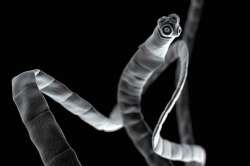Tapeworm could help cure Zika virus infection
Researchers have found some existing drug compounds – including one already used as a treatment for tapeworm infection in humans – that have the potential to both stop Zika from replicating in the body and

Researchers have found some existing drug compounds – including one already used as a treatment for tapeworm infection in humans – that have the potential to both stop Zika from replicating in the body and from damaging the crucial fetal brain cells that lead to birth defects in newborns.
"This is a first step toward a therapeutic that can stop transmission of this disease," said one of the researchers Hengli Tang, Professor at Florida State University in the US.
In a paper published in the journal Nature Medicine, the investigators said they screened 6,000 existing compounds currently in late-stage clinical trials or already approved for human use for other conditions, and identified several compounds that showed the ability to hinder or halt the progress of the Zika virus in lab-grown human neural cells.
The research collaboration includes teams from the Johns Hopkins University School of Medicine, the US National Institutes of Health and Florida State University.
"It takes years if not decades to develop a new drug," Hongjun Song from Johns Hopkins University said.
"In this sort of global health emergency, we don't have that kind of time," Song noted.
"So instead of using new drugs, we chose to screen existing drugs," Guo-li Ming, Professor at the Johns Hopkins University, added.
"In this way, we hope to create a therapy much more quickly," Ming said.
The researchers noted that the promising drugs they discovered could be divided into two classes -- neuroprotective drugs, which prevent the activation of mechanisms that cause cell death, and antiviral drugs, which slow or stop viral infection or replication.
Overall, Song said, three drugs showed robust enough results to warrant further study - PHA-690509, an investigational compound with antiviral properties; emricasan, now in clinical trials to reduce liver damage from hepatitis C virus and shown to have neuroprotective effects; and niclosamide, a drug already used to combat parasitic infections by tapeworms, which worked as an antiviral agent in these experiments.
Song cautioned that the three drugs "are very effective against Zika in the dish, but we don't know if they can work in humans in the same way."
"Additional studies need to be done in animal models as well as humans to demonstrate their ability to treat Zika infection," Ming stressed.
(With IANS inputs)